In a recent speech that has sparked controversy and debate, Canadian Prime Minister Justin Trudeau alleged that prominent public personalities Tucker Carlson and Jordan Peterson get funding from the Russian government. This unsubstantiated charge prompts scrutiny regarding the accountability of public figures in asserting claims that can profoundly affect individuals’ reputations and political dialogue.
Context of the Accusation
The political environment in Canada and the United States has been characterized by escalating division and divisiveness, especially with Russia’s persistent geopolitical actions. Trudeau’s remarks occurred within a wider discourse around foreign influence in democratic systems, namely the impact of misinformation and propaganda on public perception. Despite their validity and urgency, the articulation of arguments alleging foreign intervention is vital. Trudeau’s assertions were articulated when apprehension regarding foreign interference is evident, however, they lack the substantiation that should accompany such grave claims.
Carlson, a former Fox News host, is recognized for his contentious perspectives that frequently contest conventional narratives. His programming has struck a chord with a substantial segment of the American populace, especially those disenchanted with conventional media channels. Jordan Peterson, a clinical psychologist and author, has attracted prominence for his criticisms of political correctness and his promotion of free expression. Both individuals have amassed considerable followings, which may partially elucidate Trudeau’s intentions for attacking them. Accusing without proof degrades public discourse integrity and raises ethical questions about political speech.

The Accountability of Political Leaders
Political leaders possess a distinct obligation to maintain truthfulness and integrity in their statements. In the context of making claims that could substantially influence public perception and individual reputations, the onus of proof ought to rest with the accuser. Trudeau’s allegations appear to disregard this essential premise, jeopardizing the integrity of faith in political institutions. The lack of proof supporting such significant allegations may result in a slippery slope, when baseless accusations serve as instruments of political manipulation, distracting from meaningful policy debates.
Trudeau’s claim may have significant consequences. Public characters such as Carlson and Peterson possess the capacity to profoundly impact the political landscape. By designating individuals as potential operatives of a foreign government, Trudeau not only endangers their careers but also suppresses free expression. In democracies, citizens ought to express dissenting viewpoints without the imminent risk of being categorized as foreign agents. The claims threaten to foster an atmosphere in which fear suppresses open discourse, so weakening the fundamental tenets of democratic participation.
The Consequences of Misinformation
Misinformation is a prevalent problem in modern politics. In an era where information disseminates rapidly, the repercussions of baseless assertions can be harmful. Trudeau’s allegations against Carlson and Peterson may be readily exploited to create narratives that exacerbate societal polarization. As individuals and groups embrace these assertions, they may disseminate them without critical scrutiny, fostering a culture of disinformation.

Moreover, the ramifications of these allegations transcend the parties directly implicated. When a leader asserts a claim without evidence, it can engender widespread distrust in political discourse. Citizens may start to doubt the legitimacy of subsequent assertions made by political leaders, resulting in a perilous cycle of skepticism and disengagement. This loop can undermine democratic processes, as informed citizen engagement depends on trust in political institutions and leaders.
The Necessity for Accountability
Given Trudeau’s allegations, there is an urgent necessity for responsibility in political discourse. Leaders should be held to a standard that prioritizes the significance of evidence-based assertions. Upon the emergence of claims, methods must be established to verify their validity, promoting a culture of accountability and transparency in political dialogue. Public authorities must acknowledge that their statements have a significant influence, shaping public opinion and potentially impacting the course of individuals’ lives and careers.
Furthermore, the media occupies a pivotal position in this dynamic. Journalists and pundits ought to view such allegations with suspicion, requiring evidence before disseminating claims. In the prevailing climate of sensationalism, the media has a moral obligation to favor honesty over clickbait. A comprehensive and diligent analysis of political statements helps mitigate the spread of disinformation, so fostering a more robust democratic environment.
The Wider Consequences of Allegations
Trudeau’s allegations against Carlson and Peterson are not isolated occurrences; they signify a wider tendency in modern politics where leaders may employ sensational assertions to divert attention from critical concerns. In a time characterized by economic difficulties, healthcare emergencies, and environmental issues requiring immediate focus, attacking prominent people may act as a distraction from meaningful policy discourse.

..
Trudeau’s claims regarding Carlson and Peterson may be interpreted as a tactical maneuver to shift public debate. By redirecting attention to allegations of foreign interference, Trudeau may seek to avoid examination of his administration’s management of significant internal concerns. This strategy, however, is laden with pitfalls, as it may rebound and result in a heightened examination of the accuser’s character and motives.
In conclusion, Prime Minister Justin Trudeau’s accusations against Tucker Carlson and Jordan Peterson underscore the necessity for accountability and honesty in political discourse. Unsubstantiated allegations of foreign interference can profoundly impact both the individuals implicated and the integrity of democratic participation. Leaders must be prudent in their utterances, acknowledging the possible consequences of their words. Citizens must critically assess assertions made by public officials and require evidence for significant accusations. Ultimately, cultivating a political culture grounded in truth and transparency is vital for the maintenance of democratic principles and informed public discourse.
Follow us on social media: Instagram, Threads & Twitter X @nya360_ YouTube & Facebook @nya360.





